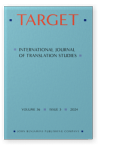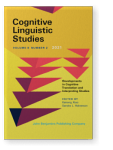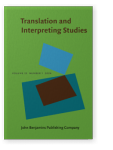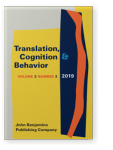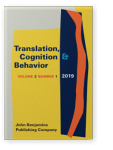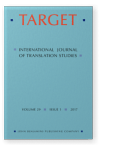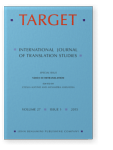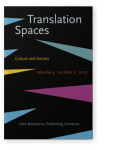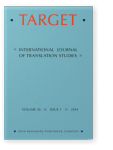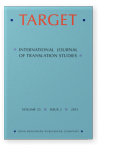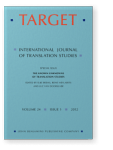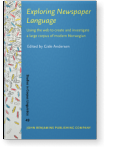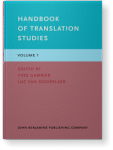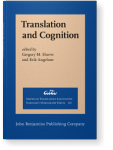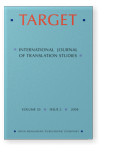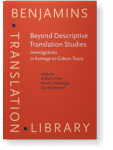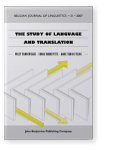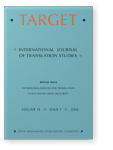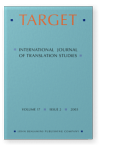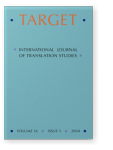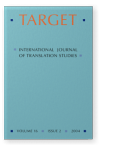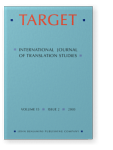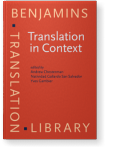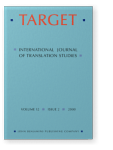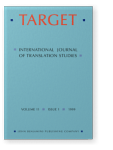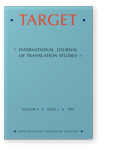Sandra L. Halverson
List of John Benjamins publications for which Sandra L. Halverson plays a role.
Journal
Title
Developments in Cognitive Translation and Interpreting Studies
Edited by Kairong Xiao and Sandra L. Halverson
Special issue of Cognitive Linguistic Studies 8:2 (2021) vi, 278 pp.
Subjects Cognition and language | Cognitive linguistics | Cognitive psychology | Neurolinguistics | Psycholinguistics
2024 Lexical bundles in formulaic interpreting: A corpus-based descriptive exploration Translation and Interpreting Studies 19:1, pp. 33–56 | Article
Inspired by Henriksen (2007), this article investigates some key characteristics of formulaic interpreting, understood as the recurrent use of linguistic formulae in interpreted texts. Using a Chinese-English corpus of consecutive interpreting in the political setting (CICPPC), the study… read more
2021 Cognitive Translation and Interpreting Studies (CTIS): Emerging trends in epistemology and methodology Developments in Cognitive Translation and Interpreting Studies, Xiao, Kairong and Sandra L. Halverson (eds.), pp. 235–250 | Introduction
2019 ‘Default’ translation: A construct for cognitive translation and interpreting studies Translation, Cognition & Behavior 2:2, pp. 187–210 | Article
Investigating translation and interpreting from the perspective of a non-computational theory of cognition requires continuing development of the requisite theoretical constructs. As part of the ongoing elaboration of this alternative approach, this paper proposes the construct of ‘default… read more
2019 ‘Monitoring’ in translation: The role of visual feedback Translation, Cognition & Behavior 2:1, pp. 1–34 | Article
We assume that visual feedback from the written trace during translation plays an important role in monitoring the emerging translation. In this study, 44 participants translated with and without visual feedback from the target text (TT). Numerous measures were used to explore the differences… read more
2017 In Memoriam Gideon Toury (1942–2016) Target 29:1, pp. 1–6 | Obituary
2015 Letter from the editors Voice in Retranslation, Alvstad, Cecilia and Alexandra Assis Rosa (eds.), pp. 1–2 | Editorial
2015 Cognitive Translation Studies and the merging of empirical paradigms: The case of ‘literal translation’ Culture & Society issue, pp. 310–340 | Article
The current reintroduction of the concept of ‘literal translation’ is an important development for two main reasons. Firstly, it has led to a range of intriguing empirical findings. Secondly, this revival exemplifies a more profound development in the field. This paper argues that the trajectory of… read more
2014 Letter to the readers Target 26:1, pp. 1–2 | Editorial
2013 Letter to the readers Target 25:2, p. | Subsection
2012 Lewandowska-Tomaszczyk, Barbara & Marcel Thelen, eds. 2010. Meaning intranslation The Known Unknowns of Translation Studies, Brems, Elke, Reine Meylaerts and Luc van Doorslaer (eds.), pp. 194–197 | Review
2012 Metonymic extension and vagueness: Schengen and Kyoto in Norwegian newspaper language Exploring Newspaper Language: Using the web to create and investigate a large corpus of modern Norwegian, Andersen, Gisle (ed.), pp. 285–306 | Article
The language sample provided by the Norwegian Newspaper Corpus (NNC) provides an appropriate corpus for the investigation of emerging uses of existent linguistic forms. A case in point is the development of new metonymical uses of place names; such uses often involve reference to events located at… read more
2010 Translation Handbook of Translation Studies: Volume 1, Gambier, Yves and Luc van Doorslaer (eds.), pp. 378–384 | Article
2010 Cognitive translation studies: Developments in theory and method Translation and Cognition, Shreve, Gregory M. and Erik Angelone (eds.), pp. 349–369 | Article
The work of cognitive translation scholars, while motivated by questions about translational phenomena, necessarily engages with theoretical developments in the disciplines of psycholinguistics, bilingualism, psychology, cognitive science, and second language acquisition. Developments internal to… read more
2008 Translations as institutional facts: An ontology for "assumed translation" Beyond Descriptive Translation Studies: Investigations in homage to Gideon Toury, Pym, Anthony, Miriam Shlesinger † and Daniel Simeoni (eds.), pp. 343–362 | Article
2007 A Cognitive Linguistic Approach to Translation Shifts The Study of Language and Translation, Vandeweghe, Willy, Sonia Vandepitte and Marc Van de Velde (eds.), pp. 105–121 | Article
2006 Olohan, Maeve. 2004. Introducing corpora in Translation Studies Heterolingualism in/and Translation, Meylaerts, Reine (ed.), pp. 186–191 | Review
2005 Mauranen, Anna & Pekka Kujamäki, eds. 2004. Translation universals: Do they exist? Target 17:2, pp. 373–380 | Review
2004 Doherty, Monika. 2002. Language processing in discourse: A key to felicitous translation Target 16:1, pp. 186–189 | Review
2004 Assumed translation: Reconciling Komissarov and Toury and moving a step forward Target 16:2, pp. 341–354 | Discussion
2003 The cognitive basis of translation universals Target 15:2, pp. 197–241 | Article
At present, there are few attempts to provide external explanations for the patterns subsumed under the heading of “translation universal”. In this paper, I discuss the possible cognitive basis for the patterns/processes that have been variously referred to as simplification/generalization,… read more
2000 Prototype effects in the “translation” category Translation in Context: Selected papers from the EST Congress, Granada 1998, Chesterman, Andrew, Natividad Gallardo San Salvador and Yves Gambier (eds.), pp. 3–16 | Article
2000 The Fault Line in Our Common Ground Target 12:2, pp. 356–362 | Discussion
1999 Conceptual Work and the "Translation" Concept1 Target 11:1, pp. 1–31 | Article
The concept of "translation" is required to carry a considerable load at several levels of inquiry. It functions as a causal element in sociological theories, and as a methodological tool, when used extensionally. Most importantly, it is the concept which in some way structures the field which we… read more
1997 The Concept of Equivalence in Translation Studies: Much Ado About Something1 Target 9:2, pp. 207–233 | Article
Within translation studies, there remains a certain amount of unnecessary discord concerning the use of the equivalence concept and its relevance for translation theory. In the interest of better understanding the various points of view, it seems helpful to consider different perspectives on this… read more
